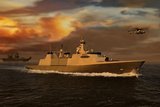US Navy ships gain remote maintenance support
Fairbanks Morse engines power a number of USN ship classes including the Expeditionary Sea Base vessels. (Photo: USN)
A recently approved Naval Sea Systems Command (NAVSEA) contract awarded to Fairbanks Morse Defense (FMD) authorises roll-out of the FM OnBoard anomaly detection system for the company's engines installed on USN vessels. The system will be run in concurrence with endurance testing of an engine electronic fuel injection retrofit.
The FM OnBoard system provides hands-free tools and technical instructions in an augmented workforce environment designed to increase operational availability, improve first-time fix rates and reduce repair time on ships,
It supports remote video collaboration allowing onboard personnel to engage directly with an offsite service advisor using mixed reality headsets. Through use of a digital twin that emulates the current state of an item of equipment in real time, maintainers can interact and monitor local assets and detect anomalies.
Related Articles
Newest LPD Flight II ship to feature Fairbanks Morse engines
USN commissions Freedom-variant LCS 21
Robots put to test for naval maintenance, inspection and repair
FMD CEO George Whittier said: 'Technicians can instantly leverage remote expertise from anywhere in the world, which reduces costs and ensures that crews are always mission ready.'
USN ship classes equipped with FMD's diesel engines include the Freedom-class Littoral Combat Ship, John Lewis-class Fleet Replenishment Oiler and Lewis B Puller Expeditionary Sea Base.
Related Equipment in Defence Insight
More from Naval Warfare
-
![UK’s Fleet Solid Support ship programme deemed on track despite steel supply concerns]()
UK’s Fleet Solid Support ship programme deemed on track despite steel supply concerns
Shipbuilders are saying the programme is going ahead on time as the government estimates 7.7 million tonnes of steel are needed for 2026 infrastructure projects.
-
![Raytheon unveils details of its proposal for the US Navy/NATO ESSM Next Significant Variant]()
Raytheon unveils details of its proposal for the US Navy/NATO ESSM Next Significant Variant
In an exclusive interview with Shephard, Raytheon’s VP of Shipboard Missiles disclosed what improvements the company plans to offer for the Sea Sparrow NSV.
-
![US Coast Guard Cutter Polar Star’s 50-year service highlights capability gaps in Antarctica]()
US Coast Guard Cutter Polar Star’s 50-year service highlights capability gaps in Antarctica
Delays in the construction of the Polar Security Cutter – the future substitute for the Polar Star – are likely to prolong the ageing icebreaker’s service time even more, putting the USCG in a risky position.
-
![As Indonesia doubles up its order, who else is looking at the Arrowhead 140 frigate design?]()
As Indonesia doubles up its order, who else is looking at the Arrowhead 140 frigate design?
The adaptable design of Babcock’s Arrowhead 140 frigate, already selected by the UK Royal Navy and Poland, has led to more orders from Indonesia while other countries continue to weigh it up.























